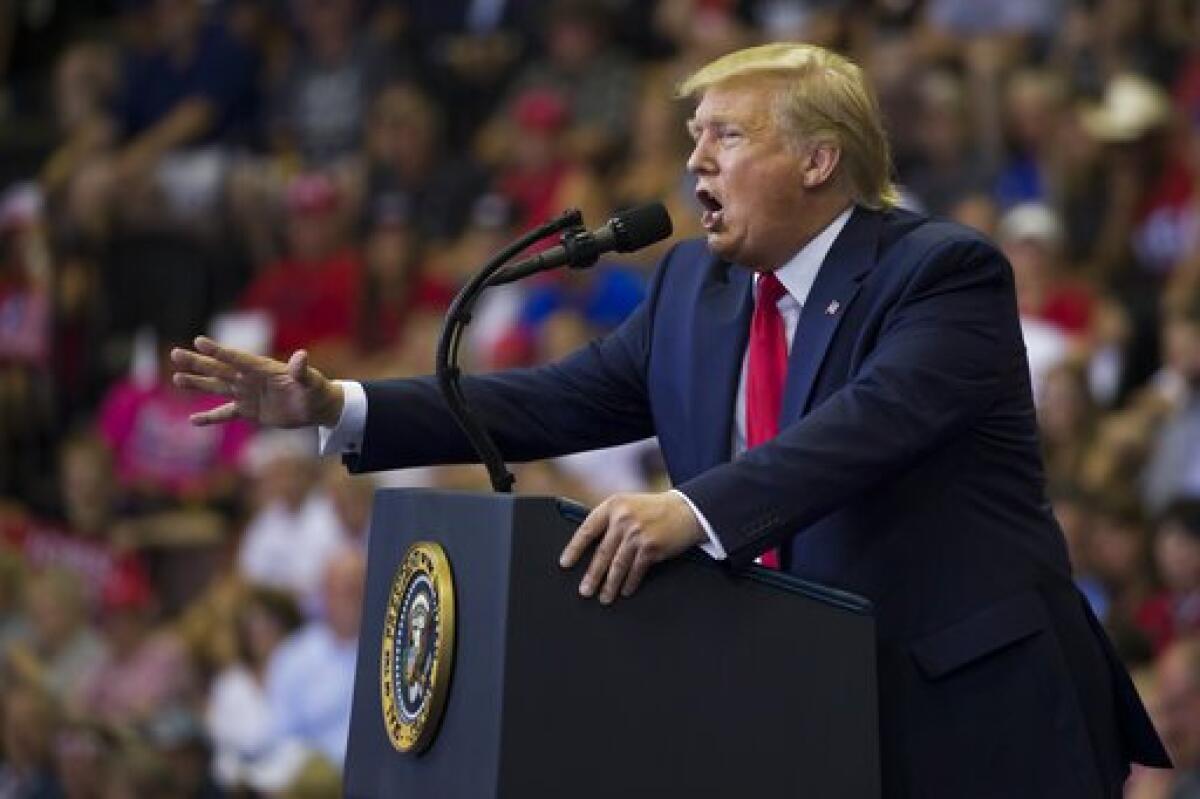Trump’s Jewish comments play on anti-Semitism in culture, film and art

- Share via
Nazi caricatures of Jews as conniving, scurrilous schemers — a people of hooked noses and sinister motives — infused the art, literature, film and propaganda that led to the Holocaust. Jews had been stereotyped for centuries across Europe as devious and untrustworthy. They hoarded money, killed Jesus, betrayed the French, brought vermin and disease.
President Trump’s comments Wednesday that Jews who voted for Democrats would be “very disloyal” to Israel were certainly not as potent as Nazi-era iconography. But to many they echoed with a veiled anti-Semitism that has lingered through his administration, from his refusal to condemn neo-Nazis marching in Charlottesville, Va., in 2017 — who marched to the cry of “Jews will not replace us” — to not explicitly rebuking white supremacist David Duke during the 2016 campaign.
A former reality TV star, Trump knows the power of an image, the sting and resonance of a word. His comments about Jewish political loyalty conjure the aura of pejorative cultural depictions stretching from Charles Dickens’ pickpocket ringleader Fagin in “Oliver Twist” to Nazi-era posters of furtive, double-dealing rabbis to swastikas and racist cartoons posted on alt-right websites and chat rooms.
“The charge of disloyalty has been used to harass, marginalize, and persecute the Jewish people for centuries,” the Anti-Defamation League said in a statement. “Sometimes referred to as the ‘dual loyalty’ charge, it alleges that Jews should be suspected of being disloyal neighbors or citizens because their true allegiance is to their coreligionists around the world or to a secret and immoral Jewish agenda.”
Long cast as outsiders and scapegoats, Jews have often been portrayed with derogatory characteristics: The greedy, if complicated, moneylender Shylock in Shakespeare’s “The Merchant of Venice”; the cunning Jew who tricks German royalty in “Jud Süss,” a 1940 film ordered up by Adolf Hitler’s propaganda minister Joseph Goebbels; and the 16th century painting “Christ Among the Doctors” by Albrecht Durer, which portrays a glowing, innocent Renaissance Jesus surrounded by craven and disfigured Jewish scholars.
In his 19th century novel “The Marble Faun,” Nathaniel Hawthorne wrote that Jews were reminiscent of “maggots when they overpopulate a decaying cheese.” In the 1930s, radio priest Father Charles Coughlin had a fervent following in America for his virulently anti-Semitic sermons. Charges that Jews control Hollywood and the media are still prevalent today on alt-right social media.
“Through the Darkest of Times,” set in Nazi-era Germany, asks players: Would you resist? Its developers say that if your game doesn’t include the horrors of the Nazi regime then your game shouldn’t include Nazis.
Many such renderings sprang from a culture controlled by Christian leaders, including the Vatican in Rome, which did not until 1965 disavow the notion — written in the Gospel of John — that Jews were responsible for Jesus’ crucifixion. Such religious beliefs were politicized in the 20th century when Jews were stereotyped as devoted to the Marxist and Communist ideologies that defined the Cold War.
“To my fellow American Jews, particularly those who support @realDonaldTrump: When he uses a trope that’s been used against the Jewish people for centuries with dire consequences, he is encouraging — wittingly or unwittingly — anti-semites throughout the country and world,” Sen. Chuck Schumer of New York, the Democratic leader, posted this week on Twitter. “Enough.”
As Trump attacks Jewish Democrats and Muslim congresswomen, HBO’s “Our Boys,” set amid the Israeli/Palestinian conflict, walks a political tightrope.
Allegations of anti-Semitism have dogged the White House even though Jared Kushner, the president’s son-in-law and one of his closest advisers, is Jewish; Trump’s daughter, Ivanka, converted to Judaism before marrying Kushner. In July, the Trump administration was forced to un-invite cartoonist Ben Garrison to a social media summit. Garrison had drawn a cartoon of the Rothschild family and George Soros — wealthy Jewish philanthropists — acting as puppet masters over the U.S. government.
Trump’s statements about Jews being disloyal if they vote for Democrats came as the president was facing criticism in the U.S. and Israel for urging Israeli Prime Minister Benjamin Netanyahu not to allow two Muslim congresswomen — Democrats Rashida Tlaib of Michigan and Ilhan Omar of Minnesota — to enter his country. Omar has been accused of anti-Semitic remarks in criticizing Israeli policy.
The atmosphere grew more surreal this week when Trump was praised by conservative commentator and conspiracy theorist Wayne Allyn Root for being “the greatest president for Jews.” Root likened Trump to “the king of Israel.” Trump tweeted the remarks.
Asked Wednesday whether his remarks could be construed as being anti-Semitic, Trump — who called himself “the chosen one” — insisted, “No, no, no. It’s only in your head,” before leaving Washington to address military veterans in Kentucky. “It’s only anti-Semitic in your head.”
More to Read
The biggest entertainment stories
Get our big stories about Hollywood, film, television, music, arts, culture and more right in your inbox as soon as they publish.
You may occasionally receive promotional content from the Los Angeles Times.











